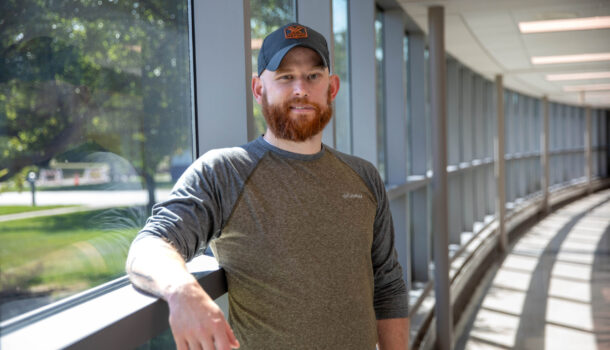ABOVE PHOTO: Matt Stevenson, 33, of Menomonie, talks about his experience with suicide during National Suicide Prevention Month to educate people on the warning signs.
Matt Stevenson knows that his story is tough to hear. He also knows it’s worth telling.
If he can reduce the stigma of suicide and save just one life by educating people about the signs of suicide, it’s worth reliving the moments he almost lost his life to suicide, he said.

“I’m gonna have my good days. I’m gonna have my bad days. Just knowing that and being able to utilize some of those coping skills – it’s second nature to be able to apply those skills now, I’m gonna have my good days. I’m gonna have my bad days. Just knowing that and being able to utilize some of those coping skills – it’s second nature to be able to apply those skills now,”
-Matt Stevenson
Stevenson, 33, a nursing program student at Chippewa Valley Technical College, is sharing his story of depression, thoughts of suicide and attempted suicide to highlight awareness during Suicide Prevention Month.
“We can talk about statistics until we’re blue in the face. It doesn’t hit home until you hear somebody say it,” Stevenson said. “If I say, ‘Hey, these are some things I’ve experienced,’ it definitely hits home a little bit more.”
Depression
Stevenson was a typical kid by all standards. He grew up in a loving home in Menomonie, was a three-sport athlete and had many friends.
But depression and suicidal thoughts don’t discriminate.
In eighth grade, Stevenson began to experience depression and suicidal ideation. That was the first time he contemplated suicide.
“I eventually told a friend what I was thinking. She told her mom, and then counselors got involved,” he said. “I was self-harming. I was hitting myself.”
School counselors followed up with Stevenson. The depression he was experiencing subsided until his sophomore year of high school in 2007.
The depression came back with a vengeance.
He was under the pressure of school and sports, shaking off an unwanted nickname and a long winter.
“It was kind of an accumulating storm,” Stevenson said. “It was the end of December when I started to contemplate suicide. I came up with a date and a plan.”
The plan was pushed up and set into motion on January 9, 2007, when an impromptu sports meeting didn’t go as planned. It was just one more brick on the teetering pile in Stevenson’s mind.
“I started breaking down right in the middle of the gym, and I turned to my best friend, and I said, ‘Tell people to remember me,’ ” Stevenson recalled. “He didn’t understand what I was saying. He grabbed my arm, and I said, ‘No. I have to do this.’ ”
That’s when Stevenson ripped his arm away from his friend’s grip, got into his car and drove home.
“The last thing I remember was laying on the ground thinking of a previous friend who had completed suicide. I thought about what his funeral was like and about his family at the funeral,” he said. “Then I woke up in the hospital … with my jaw wired shut.”
Stevenson can look back on that time with a clearer view. He didn’t want to die, but he didn’t know how to manage the depression, anxiety and the blanket of physical pain that comes with those ailments, he said. He wanted the pain to stop.
After his suicide attempt, he began seeing a counselor. He learned coping skills, identified his support system and is utilizing medication to treat depression and anxiety.
Stevenson said he knows mental health is something he will struggle with, likely his whole life. But he has tools to better identify when he is struggling and then a plan in place to help.
CVTC Nursing Instructor Dawn Barone said she learned of Stevenson’s experience only a few weeks ago. She might never have known, except Stevenson was comfortable enough with Barone to tell his story.
“I am just so proud of Matt,” she said. “Though I know that he will always be challenged by his past, he is passionate about helping to support others when they are challenged as well. While knowing a bit about Matt’s history adds to my pride in him as a student and future nurse, it is clear that there is so much more to his nursing journey, and I know he will have a great future in nursing wherever he goes.”
Working through the rigorous nursing program at CVTC can be a source of stress for Stevenson, but he said it also keeps him on track and working toward his ultimate goal of becoming a nurse.
“I’m gonna have my good days. I’m gonna have my bad days. Just knowing that and being able to utilize some of those coping skills – it’s second nature to be able to apply those skills now,” he said.
His passion for helping others, coupled with his first-hand experience with suicide ideation, makes him a compassionate source to educate others.
“I want people not to be afraid to ask (if someone is thinking about suicide),” he said. “Just don’t be afraid to ask. I was losing interest in things. I stopped playing hockey. Even if you’re unsure, don’t be afraid to ask because the worst they are going to say is ‘no.’ ”

If you or someone you know has thoughts of suicide, text the Crisis Text Line HELLO to 741741; call, text or chat Suicide & Crisis Lifeline at 988; or call the National Suicide Prevention Lifeline at 800-273-8255.


